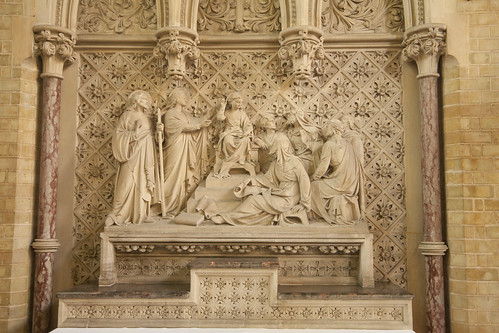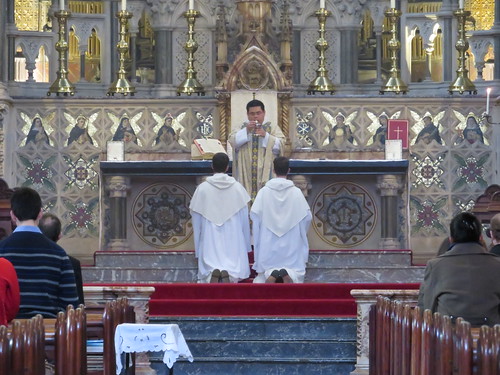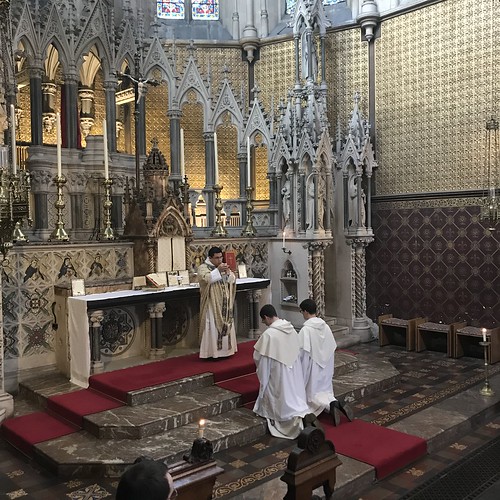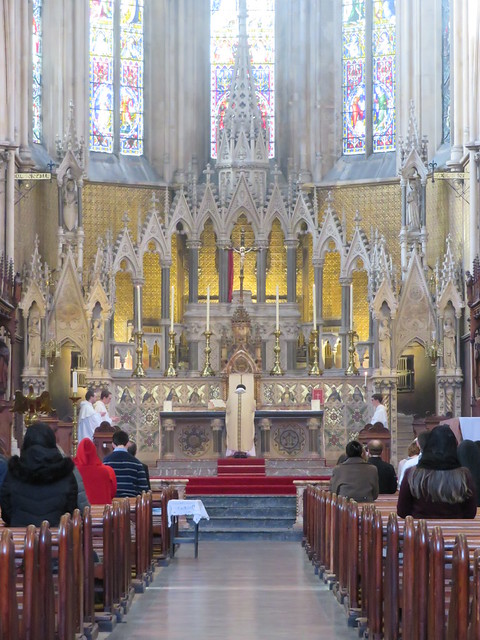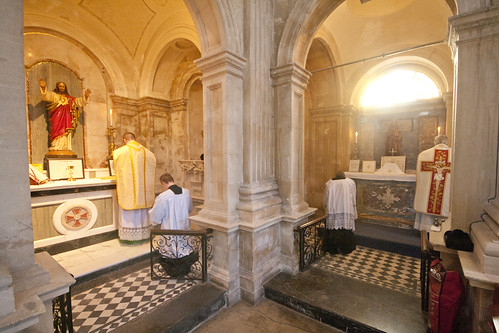Chairman's Blog
Felt banners and participation
My latest for LifeSiteNews.
Survey of US Traditional Catholics
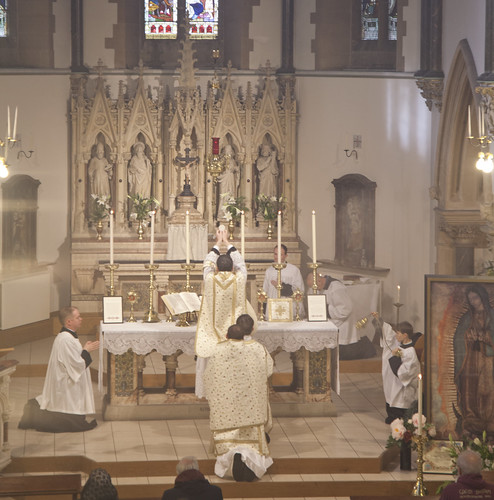 |
| LMS Pilgrimage to Our Lady of Guadalupe, in the Church of St Joseph, Bedford |
I have a piece in LifeSiteNews on this widely-reported survey, which says exactly what one would expect: Catholics attached to the Traditional Mass overwhelmingly believe the teachings of the Church and fulfill their obligations to attend Mass and go to confession.
I think the survey is a good effort, but I'd like to put its contrast with data from other surveys on the beliefs and practices of Catholics as a whole into some context, beyond what I wrote for LifeSite.
Conservative Catholics reading the period results of mainstream Catholic opinion and
practice may get the feeling that the findings exceed their most pessimistic estimate of their
co-religionists. Amazingly few Catholics appear to know, let alone confess, the teaching of the Church on the Real Presence; scarcely any actually follow the Church’s teaching on contraception.
One reason for this is poor methodology in the surveys themselves. Notoriously, one survey
which claimed that almost no Catholics accepted the Church’s ban on contraception arrived at this conclusion by excluding from consideration various categories of women; with other flaws, this made the survey pretty worthless.
Even the respected research institute attached to Georgetown University, CARA, tends to survey ‘self-identified’ Catholics instead of Church-going Catholics. But what does it mean to ‘identify’ as a Catholic while rejecting all her teachings and never going to Church? The results of surveys including this category will reflect how many such people there are; how many there are in turn depends not only on the rate of lapsation and poor formation, but in the strength of the idea that one can be a ‘Catholic’ in some tribal sense completely unconnected with belief and practice.
Interestingly, in Britain a recent academic study showed that Anglicans are very happy to keep calling themselves Anglicans when they have lapsed, while Baptists stop calling themselves Baptists if they aren’t fully committed. The attitude of Catholics falls between these extremes. A less complete study would have suggested that Baptists are far more committed than Anglicans, but also more likely to lapse, which would have been misleading: in effect it compared committed Baptists and uncommitted Anglicans.
What this survey of church-going Catholics, attached to the ancient Latin liturgy, shows is that, within the undifferentiated mass of ‘Catholics’ who have a confusingly wide range of views and religious practices, there is at least one sub-group which is genuinely faithful to the Church, her teachings and requirements, and who average a reasonable number of children to whom this Faith can be passed on.
In the meantime, we should be grateful that serious statistical study of Latin Mass-going Catholics has finally begun.
Fr Andrew Pinsent to speak Friday 22nd in London
|
Fri 22 Iota Unam talk, Fr Andrew Pinsent: 'The Traditional Mass and the Formation of the Virtues' 7pm in the basement at Our Lady of the Assumption, Warwick Street.
Doors open at 6:30pm
All welcome. £5 on the door.
Our Lady of the Assumption and St Gregory
Warwick Street LONDON, W1B 5LZ The talk will be preceded by drinks and followed by questions and a recitation of Compline of the Little Office of the Blessed Virgin Mary.
Fr Andrew Pinsent has doctorates in both Physics and in Philosophy, as well as theological training, and is Director of the Allan Ramsey Centre in Oxford University.
This is the second of the Iota Unum series of talks, which will focus on topics connected with the everyday life of traditionally-minded Catholics: the domestic church, homeschooling, traditional catechesis, moral instruction, culture (high, common, and religious), religious history etc..
The purpose of the talks is not only to inform but to help traditionally-minded Catholics from across London and beyond to meet, discuss matters of mutual concern, and form a greater sense of community.
There will be a charge of £5 on the door to cover refreshments and other expenses.
|
Other events coming up in London |
|
March
Wed 6: Ash Wednesday Mon 11: Houghton Schola at Maiden Lane, Feria of Lent Sat 9: St Tarcisius server training Day/ Guild of St Clare Vestment Mending Day Sat 16: LMS Pilgrimage to Caversham: Ember Day. Mass 11:30am with polyphony Mon 18: Cantus Magnus Polyphonic Mass at Maiden Lane, St Cyril of Jerusalem Fri 22: Juventutem Mass at St Mary Moorfields, 7:30pm Tues 26: Iota Unam talk, Stuart & Clare McCullough ‘The liturgy and crisis pregnancy counselling’ April
Fri 5-7: St Catherine's Trust Family Retreat & Gregorian Chant Network Chant Course Fri-Sun at the Oratory School, Woodcote: see here. |
Ivereigh: what makes you think Christ wasn't gay?
The issue, as the priests make clear, isn’t celibacy and chastity, but having to hide who they are. The denial makes it impossible to live the vow in freedom. That’s what they’re saying.
They must serve God and his people without the entanglement of manifesting or hiding a hidden tendency. The priests, I believe, must be heterosexual. They act in persona Christi. And I do not think our Lord had homosexual tendencies.
Why do you say that our Lord did not have homosexual tendencies? From what signs or sayings or gestures do you deduce this?
Is Muller an anti-pope?
Silly question, of course, but that's what Austen Ivereigh suggested on Twitter.
My latest on LifeSiteNews:
A naked power play. Declare a state of confusion, then promote yourself as the one to “resolve” it. In implying that a former Vatican bureaucrat needs to step in to fill a supposed vacuum, you delegitimise the papal magisterium. And confuse the faithful.
Sung Dominican Rite Mass in St Dominic's, Haverstock Hill
I was privileged to sing at a beautiful Dominican Rite Mass in London last Saturday, which opened a 'Retreat' organised by the New Evangelisation Committee of the Catholic Medical Association: Joseph Nunan indefatigable team. The Mass was sponsored by the Latin Mass Society.
St Dominic's, Haverstock Hill, now a Shrine to the Rosary, is a magnificent church. Mass was celebrated by Fr Lawrence Lew OP. The Dominican chants were extremely interesting and not all that straightforward, despite their close relationship with those of the Roman Rite for the feast of the day: St Cyril of Alexandria. The Schola Abelis of Oxford (or small part thereof) was led by Dominic Bevan.
It is a very encouraging sign of the times that this event was organised and so well attended. One of the organising committee wrote on Facebook about the event as a whole:
Thank you to everyone who attended the CMA Youth Day-Retreat on Saturday 9th Feb at the Rosary Shine at St Dominic's Priory, Haverstock Hill, London.
About 100 young people attended. It was a prayer-filled day, starting with Mass celebrated in the traditional Dominican Rite. The Mass is the source and summit of the Christian life, and essential for those of us who work in healthcare.
Friar Philomeno, from the Franciscan Friars in Gosport, kicked off the talks with an inspirational introduction to the life and work of Fr Patrick Peyton and his Rosary Crusades. Then we heard a powerful story from one of our Catholic nurses, who, with her family, cared for and prayed for her dying father.
After processing round the beautiful Rosary Shrine side chapels reciting the Joyful Mysteries, we had some light refreshment, then went straight into the final two talks of the day: on what it is to be a Catholic man and a Catholic women.
Thank you to all who came and all who helped. Thanks be to God for His abundant blessings. We hope to put on a similar retreat-type day on a yearly basis for the youth of the CMA, for ongoing spiritual nourishment! Photos and talks hopefully to follow.
...Have you said your Rosary today?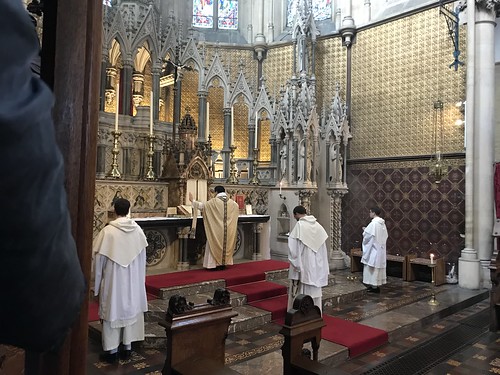
The CMA's next 'New Evangelisation' event will be:
The CMA's 4th annual youth conference
Care of the Dying Patient
5th October 2019
St Aloysius Catholic Church, London
https://www.facebook.com/
Voice of the Family Conference in Cardiff in September
This conference is open to all who are concerned with safeguarding the deposit of our faith in our families and in society. Apart from discussing the particular threats to the family and ways to counter these threats, it will be an opportunity to meet fellow Catholics and to forge a fellowship that will strengthen us as individuals and families at this turbulent time.
Fr Linus Clovis, Family Life International, New Zealand
Prof. Roberto de Mattei, Lepanto Foundation, Italy
Maria Madise, Voice of the Family, UK
John Smeaton, Society for the Protection of Unborn Children, UK
John-Henry Westen, LifeSiteNews, Canada
- Friday: registration will be open from 3pm; Holy Mass, followed by a talk and social time;
- Saturday: Holy Mass, talks and opportunities for Adoration and Confession;
- Sunday: Solemn High Mass in honour of the Nativity of Our Lady, followed by brunch.
For further information, please contact: enquiry@
Proposed Regina Caeli Academy in Bedford: Open Day
I'm happy to pass on the news of this event to anyone who might be interested. You can sign up at their Eventbrite page.
What are Side-Chapels for?
 |
| Our Lady of Sorrows, appearing to gesticulate in horror at the sculpture deposited in her chapel. |
The famous Jesuit Church, the Immaculate Conception, Farm Street, in London, is richly decorated, and boasts many exquisite side-chapels. One can imagine Lady Julia Flyte popping in to one of them to pray before her chat with her Jesuit spiritual director in Brideshead Revisited, as many Catholics must have done over the Church’s 150 years of use. In one of these, dedicated to Our Lady of Sorrows, I found, on a recent visit, a life-size park bench rendered in bronze, and on it, an equally brazen blanket covering a sleeping figure. This “Homeless Jesus” sculpture, of which there are copies in cities around the world, has found its way there because Westminster Council refused permission for it to be installed near London’s Houses of Parliament.
Server Training: this Saturday in London
 A reminder that there will be a training day for servers at St Mary Moorfields in London this Saturday, 16th, with enrollments into our Servers' sodality, the Society of St Tarcisius.
A reminder that there will be a training day for servers at St Mary Moorfields in London this Saturday, 16th, with enrollments into our Servers' sodality, the Society of St Tarcisius.
The day starts at 10:30am and should conclude by 4:30pm. All the details are here, including about the next two training days later in the spring: 9th March and 11th May.
The church is here.
Email tarcisius@lms.org.uk if you want to attend.
I'm delighted to say that the medals we commissioned for the Society of St Tarcisius have arrived, which makes enrollments possible. And they look great. We will be using different coloured cords to indicate ranks in the Society.
Naturally we had in mind the precedent set by the venerable Confraternity of St Stephen with their distinctive servers' medal: although ours is quite different in design, it is a comparable size.
 I was shocked to discover, recently, examples of the Confraternity medal made of plastic in a local sacristy. Is this a new thing? The example I have (left behind at last year's Summer School and not reclaimed), is at least made of metal.
I was shocked to discover, recently, examples of the Confraternity medal made of plastic in a local sacristy. Is this a new thing? The example I have (left behind at last year's Summer School and not reclaimed), is at least made of metal.
In any case, the Society of St Tarcisius, while inspired by the original ideals of the Confraternity, is exclusively committed to the Traditional Latin Mass, and the service of the Altar by boys and men. On Saturday, and at future training events, a priest (in this case Fr Gabriel Diaz) will bless medals and officiate at the service of enrollment.

